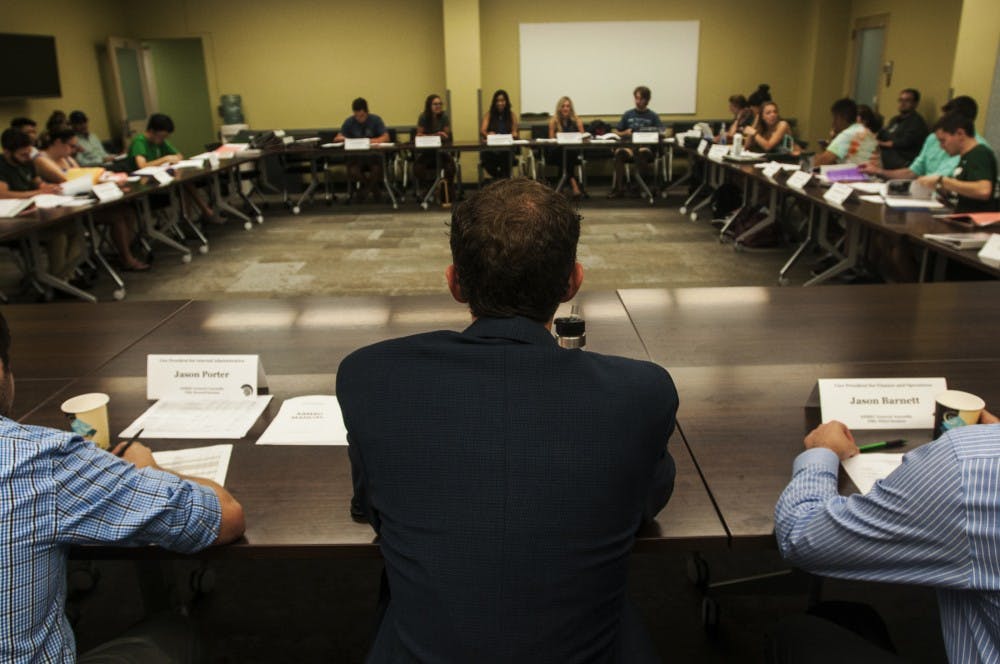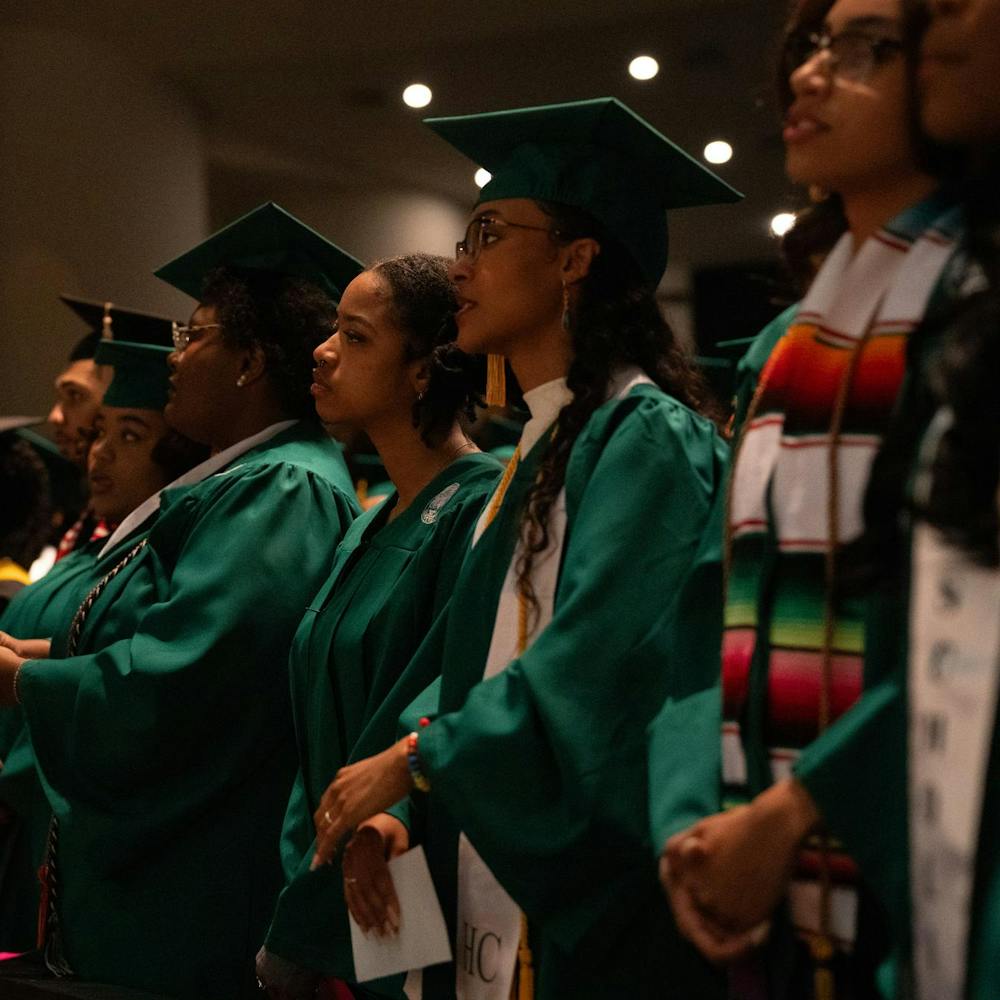The semester is in full swing, and ASMSU has settled back in. Here’s a look at what ASMSU plans to work on this spring semester.
Sexual Assault
Starting at the top, ASMSU President Lorenzo Santavicca is focused on making sure ASMSU does what it can to combat sexual assault.
However, he doesn’t plan to do it all on his own.
In addition to having the General Assembly behind him, Santavicca and ASMSU will be working with the university.
“We’re partnering with the university for the first time on a collaborative ‘It’s on Us’ campaign, where the university is actually now taking the initiative to lead a week of awareness in the spring semester,” Santavicca said.
In addition to the “It’s on Us” partnership, Santavicca wants to focus on making sure all students are treated fairly when it comes to dealing with sexual assault on campus.
He said it’s important to make sure students on both sides of the issue are considered in the event it is a student-to-student issue.
Santavicca said, “We’re working with Dr. (Denise) Maybank in Student Affairs and all the way up to President (Lou Anna K.) Simon to make sure our university administration is being held accountable in this realm.”
Mental Health
ASMSU Chief of Staff Sam Terzich is working this semester on coordinating Mental Health Awareness Week as well as overall changes to mental health at MSU.
A big thing for Terzich is making students aware of the resources available to them, as well as being active in helping students with mental illnesses or disorders.
“We try to be proactive in growing awareness of resources available to students on campus for mental health, but also engage and help students deal with college stress or larger mental health issues,” Terzich said.
On the topic of the mental health week Terzich is helping to put on, he stressed he believes it’s important to be talking about mental health right now.
“I think it’s actually a time that mental health is being talked about, not only by students but also by the administration,” Terzich said. “When that happens, I think we have an exciting chance to make a difference and impact students.”
As far as the changes Terzich hopes to see, he expects students will have much better access to mental health resources.
“I think students are going to be able to see more resources available in their neighborhoods, in the neighborhood engagement centers,” Terzich said.
RSO Consultation
Vice President for Student Allocations Lauren Fish is working with her team to focus and consulting with Registered Student Organizations, or RSOs, on campus.
This started when Fish and her colleagues checked on the outcome of RSOs that they had funded in the past.
“This kind of started with us looking into start-up groups that we had funded last year and just kind of noticing that a good chunk of them weren’t even active RSO’s anymore,” Fish said.
After deciding something had to be done to help the RSO’s, Student Allocations began working on a program.
“The main objective of our program is really to prevent new student orgs. from dissolving,” Fish said regarding the goals of the program “And then maybe, this is hopefully down the road, but even encouraging cross-collaboration between student organizations.”
As far as the work that’s being done this semester, there is a pilot program that will be run by Student Allocations, Fish said.
“We’re going to be doing case studies this semester on RSOs that are interested in helping us out and us hopefully them,” Fish said. “From there, we’re going to look to RSO consultants that were hoping to hire and train them we resources that we have at ASMSU.”
Safe Ride
MSU Safe Ride is a project Vice President for Finance and Operations Jason Barnett has been working on for awhile, but he said he feels significant progress is being made this semester.
Safe Ride, a program that has been long talked about at MSU, would offer free rides home for students that can’t otherwise get them.
While for the most part students can ride around campus on the CATA system, getting home is hard for those who live off campus.
Barnett said, “There’s not many late night transportation options in the city of East Lansing. It’s very good on campus where MSU’s CATA contract runs from 7 a.m. all the way to 2 o’clock in the morning.”
Without reliable transportation to get home, most students will choose to walk home. Barnett sees this as part of the reason Safe Ride is important.
“The purpose is really to facilitate safe, reliable transportation options home,” Barnett said. “It’s really for if you feel endangered or if you’re in an unexpected situation.”
However, Barnett said it is not just for when a student feels uneasy, and Safe Ride can be used for a multitude of reasons.
“You don’t have to feel like you’re going to be attacked, it’s just for, ‘Hey, it’s late, I’m at the library, I don’t feel like walking home alone right now, it’s cold, it’s raining, whatever,’” Barnett said. “That’s kind of where Safe Ride comes in.”
Higher Education Funding
Alex Noffsinger, ASMSU’s vice president for governmental affairs, said his team is working on advocating to get more funding for the university.
This semester, Noffsinger is looking at the different facets of the state of Michigan budget in order to find places to get funding.
Noffsinger said, “We’re starting to look at other places within the state of Michigan budget where we can advocate for greater resources.”
One place they’re looking is the Michigan State Police budget. Within that budget is the Campus Sexual Assault Grant Program, which gives $500,000 to universities to help prevent sexual assault. Noffsinger wants that amount to be even higher.
Noffsinger said, “What we’re trying to advocate for is for that to be doubled to a $1 million so schools can apply for greater amounts of funding.”
The other way Governmental Affairs is looking to help students with money is through legislation in the state of Michigan.
Noffsinger said, “The second part of it is trying to actually look at legislation that can get passed concurrently with appropriations to help students out with textbook affordability.”
These programs will be the main focus of the Office of the President this semester. Updates on these projects will be provided as they come.







